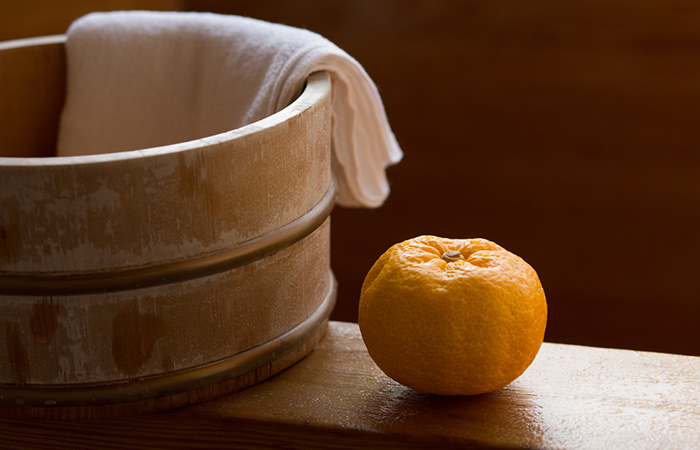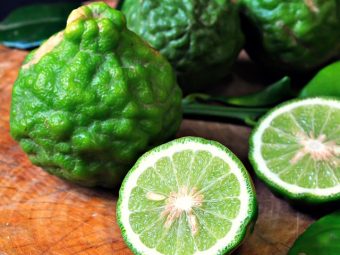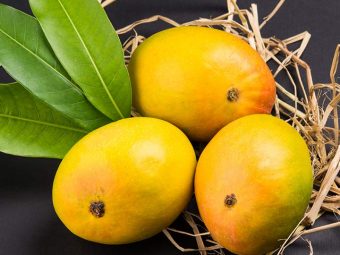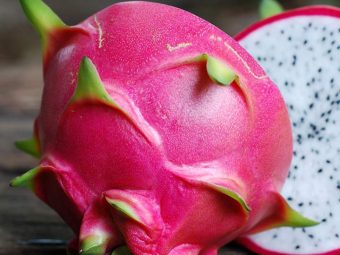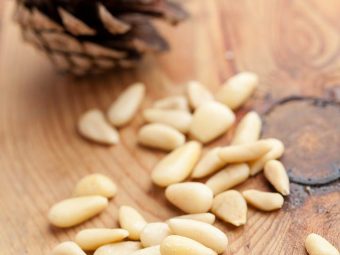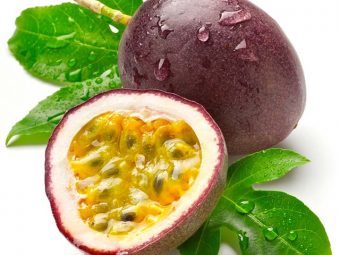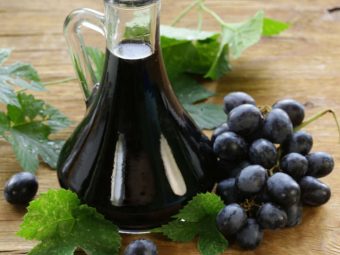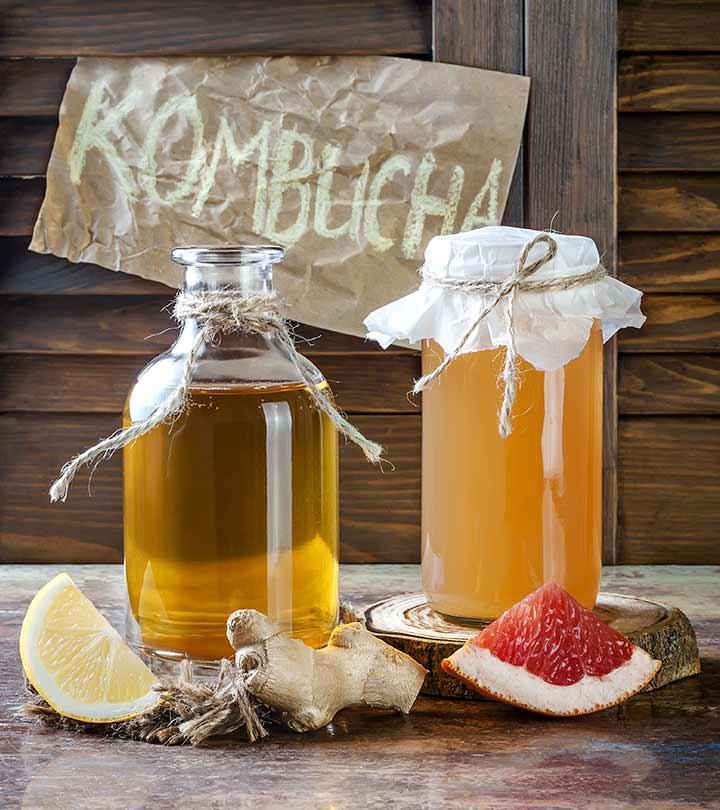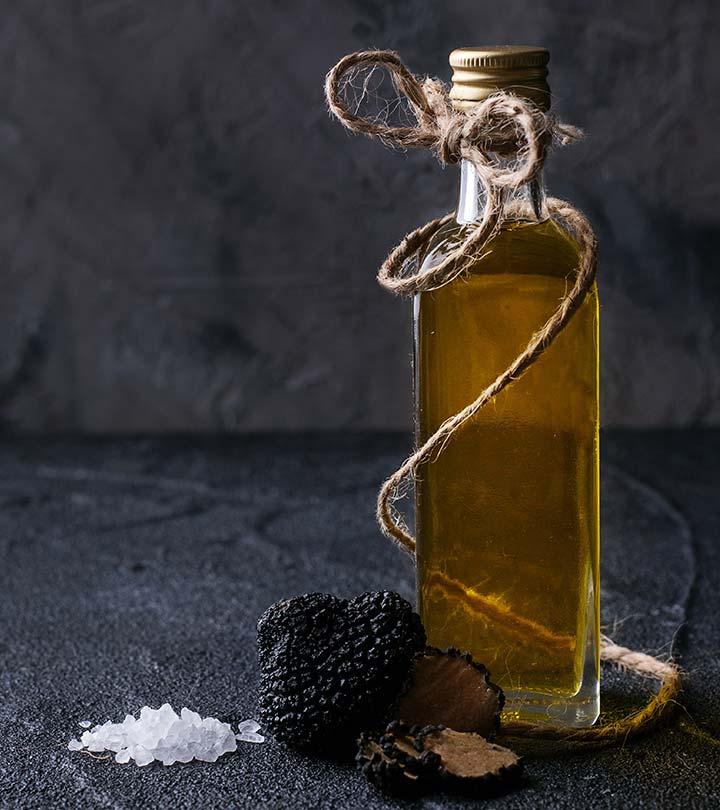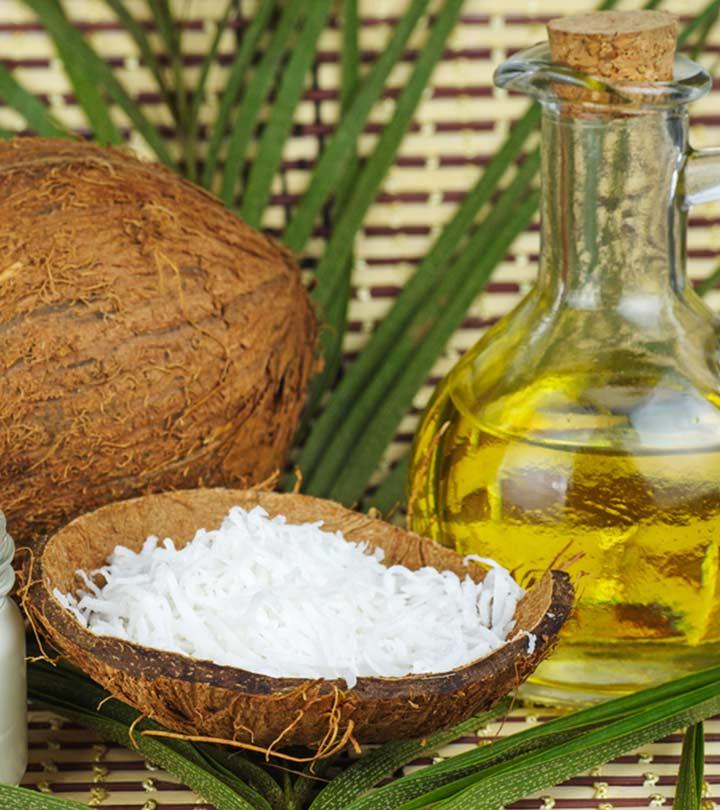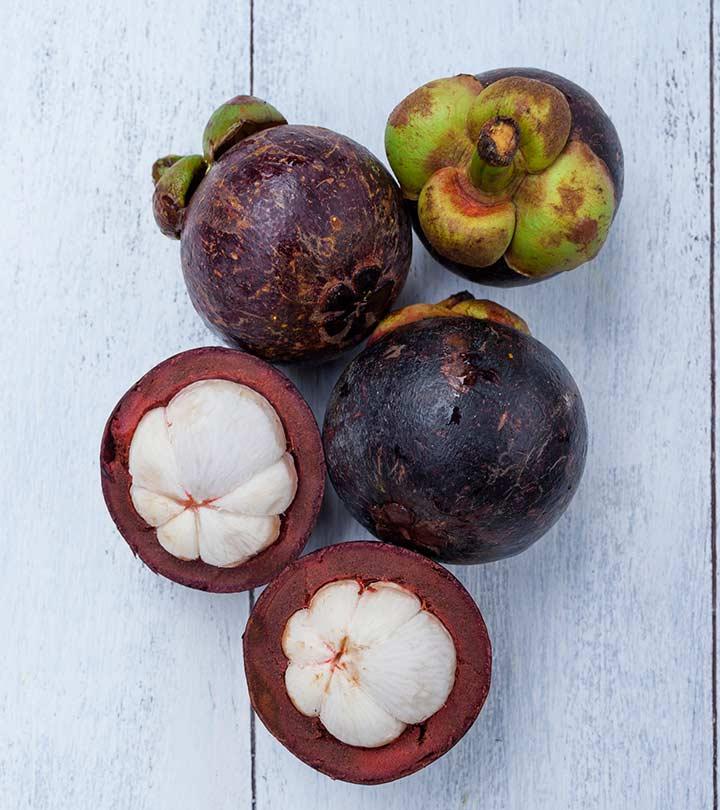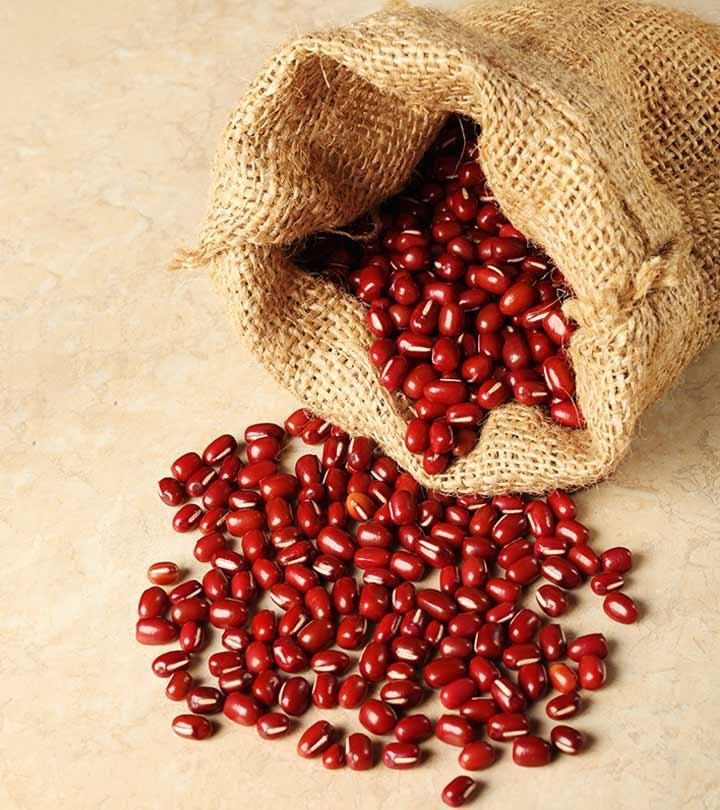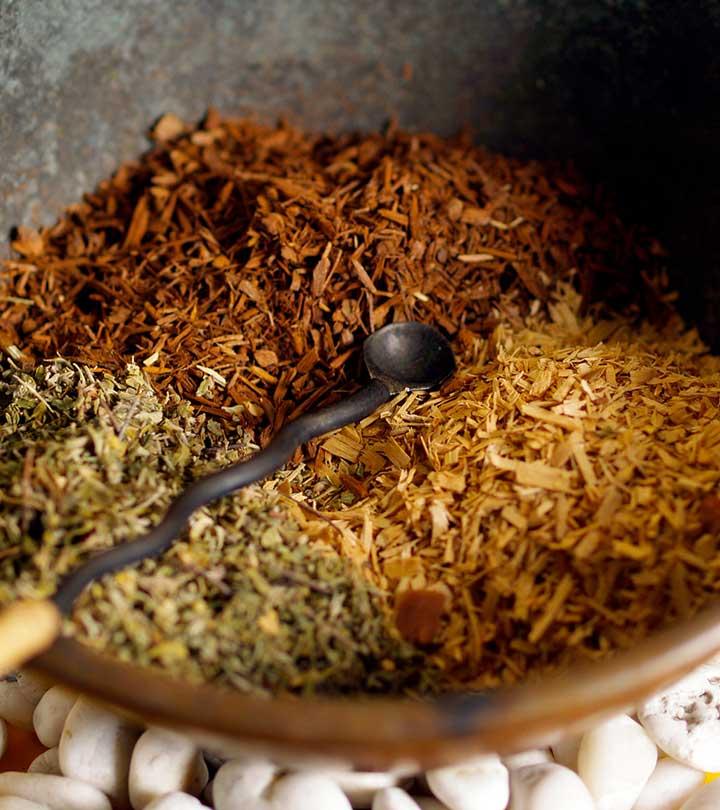Yuzu Fruit: What Is It, Health Benefits, How To Eat, And Side Effects
This sharp citrusy delight is the key to a stress-free mind and glowing skin.

Image: Shutterstock
The benefits of Yuzu fruit (Citrus junos) are gaining the attention of researchers. This fruit contains a high amount of antioxidants that may reduce cancer risk, combat inflammation and promote circulation. The rich vitamin C content supports and improves the functioning of the immune system. It has medicinal benefits and is used in traditional medicine, like other citrus fruits, to manage cough and cold symptoms. Yuzu is also said to smoothen the skin and uplift the mood. This fruit originated in China around 1200 years ago, and it was believed that its fragrance could stop evil spirits. This tangy, aromatic fruit has many health benefits. Read on to know more about its nutrition facts and side effects.
 Know Your Ingredient: Yuzu Fruit
Know Your Ingredient: Yuzu FruitWhat Is It?
A citrus fruit with flavors akin to lime and grapefruit.
What Are Its Benefits?
Prevents blood clotting due to its antiplatelet properties, reduces the risk of stroke and may improve heart health.
Who Can Use It?
People experiencing anxiety disorders and fluctuating blood sugar levels.
How Often?
One fruit or its juice per day.
Caution
May cause stomach discomfort in some people due to its high acidic levels. Consult your doctor in case of prolonged discomfort.
In This Article
What Is Yuzu Fruit?
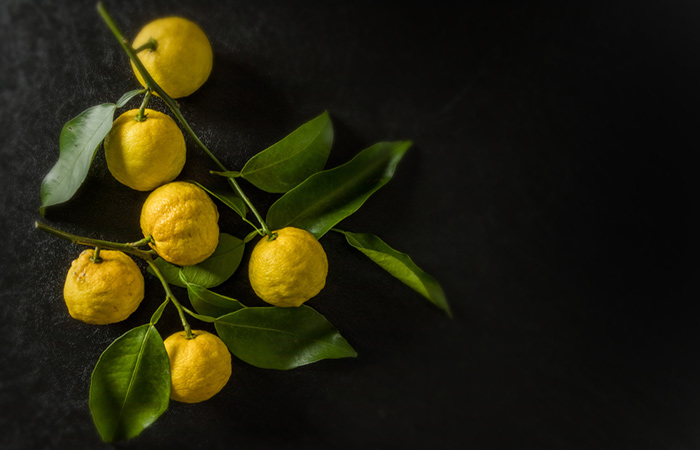
The yuzu fruit is a citrus fruit that looks like a small grapefruit (diameter 2-3 inches) with thick yellow, uneven skin. The fruit is extremely aromatic but sourer than other citrus fruits. It can be yellow or green based on its degree of ripeness. This fruit is highly nutritious and low in calories.
Kristin Gillespie, RD, says, “Yuzu fruit contains only 20 calories per fruit, and nutrients like fiber, sodium, magnesium, manganese, and vitamin C.” Yuzu (also called Yuza) is rich in antioxidants and carotenoids, flavonoids, and limonoids and has several health benefits (1), (2).
Health Benefits Of Yuzu Fruit
1. May Prevent Cardiovascular Issues
Yuzu has anti-platelet (inhibits blood clotting in the vessels) properties, which may reduce the risk of stroke and ischemic heart diseases (conditions caused by the narrowing of arteries) (3). Studies have found that the methanolic extract of yuzu has flavonoids like hesperidin and naringin, which could inhibit platelet aggregation (4), (5), (6). This can prevent blood clotting and reduce blood vessel inflammation to improve heart health. The high potassium content may help reduce blood pressure.
In addition, yuzu peel may help prevent hypercholesterolemia (high blood cholesterol levels) (7). The flavonoid hesperidin has cardioprotective properties and may prevent heart failure (8). However, more research is needed to understand the cardioprotective benefits of yuzu. It is popularly added to weight loss diet plans as it may help control cholesterol levels and its fiber content aids digestion.
2. May Fight Against Cancer
The yuzu fruit is packed with antioxidants. The carotenoid compounds and vitamin C in yuzu may reduce cancer risk (2), (9), (10), (11). A review published in Nutrients suggests that citrus fruits intake can suppress the gene expression in many degenerative diseases like cancer. Consuming citrus fruit may reduce the risk of esophageal cancer by 37% (12), (13).
A study conducted by the Cheju National University College of Medicine, Korea, has found that a high intake of citrus fruits may be protective against stomach cancer. They may also reduce pancreatic and breast cancer risk (14), (15), (16).
3. Supports Brain Health
Consuming yuzu helped prevent cognitive decline and cognitive dysfunction in an animal study (17). The soothing fragrance of yuzu has also been found to uplift the mood and alleviate emotional stress (18), (19).
In addition, citrus flavonoids may play a key role in preventing the progression of neurodegenerative diseases (ND) (20). A study conducted by the University of Reading, United Kingdom, found that daily consumption of flavanone-rich foods for eight weeks improved cognitive function in older adults (21).
However, more research is required to substantiate these claims.
4. May Help Reduce Inflammation
Yuzu peel contains limonene, an anti-inflammatory compound that has the potential to relieve bronchial asthma (22). It also has free radical scavenging properties and may prevent cell damage (23). The antioxidant and anti-inflammatory properties of yuzu peel extract can inhibit colitis (inflammatory reaction in the colon) (24). The main flavonoid of yuzu fruit, hesperidin, also possesses anti-inflammatory and antioxidant effects that help with neurodegenerative diseases (25).
 Fun Fact
Fun Fact5. May Improve Mood
The fragrance of yuzu fruit has similar aromatherapeutic benefits as the lavender scent. Studies confirmed that yuzu fragrance has aromatherapeutic benefits and may decrease anxiety and negative emotions and relax the mind (26), (27).
6. Enhances Skin Health

The ethanolic extracts of yuzu peel inhibit elastase (an enzyme that degrades elastin) activity and may delay skin aging (28). The flavonoids and other phenolic compounds in the peel extract promote procollagen synthesis and decrease melanin content to brighten the skin (29).
7. May Prevent Gout
Yuzu peel extract can be used as an anti-gout (anti-hyperuricemic) agent (28). However, further studies are required to confirm a positive effect.
8. May Regulate Sugar Levels
A study on mice fed with a high-fat diet found that ethanol extract of yuzu peel had anti-diabetic and might therefore have a role in helping regulate blood sugar levels in humans (30).
9. May Improve Bone Health
The flavanones in the ethanol extract of yuzu peel and its flavanones promote the development of osteoclasts, a type of bone cells that help repair and maintain bones. Researchers concluded that it could be a basis for developing new therapies for osteoporosis (31).
Yuzu is used as a flavoring agent in different cuisines for its excellent lemony aroma. Since it is super tart and sour, you cannot eat it as it is. Here are some tips to include yuzu in your diet.
How To Eat And Use Yuzu Fruit
You can use it as a replacement for lemons. Yuzu juice and zest are best for adding a refreshing lemony flavor to desserts, baked goods, and condiments. You can add yuzu juice to ceviche or use it as salad dressings and seafood marinades.
In East Asian cuisine, yuzu fruit juice, peel, and seeds are used as flavoring agents for seasonings, sauces, marmalades, lemonade, and ice creams.
Yuzu essential oil is also used in perfumes, lotions, and soaps.
Note: Do not ingest essential oils or use them undiluted.
Yuzu fruit juice is often used to prepare wine, cocktails, and other liquors. You can also buy yuzu juice for culinary use. However, ensure to read the label to check for the amount of added sugar. If possible, buy pure yuzu juice.
 Trivia
TriviaHere are three easy and delicious recipes you may try with yuzu fruit or juice.
Yuzu Recipes To Try
1. Yuzu Marmalade

What You Need
- 6 yuzu fruits
- ¾ cup of granulated sugar
- 3 tablespoons of yuzu juice
Process
- Cut the yuzu fruit in half. Scoop out the flesh and seeds.
- Soak the peels in a bowl of water for at least 30 minutes.
- Drain the water and scrape and discard the white part of the rind with a spoon.
- Thinly slice the yuzu peels.
- Simmer the sliced peels in water for a few minutes. Repeat this process twice.
- Drain the water, mix the yuzu peels, sugar, seeds, and juice over medium heat.
- Cook over low to medium heat until the liquid reduces and thickens.
- Turn the heat off while it is a little loose and remove the seeds.
- Pour it into a prepared preserving jar.
2. Yuzu Cocktail
What You Need
- 1 yuzu fruit
- 2 ounces of gin
- 2 ounces of club soda
- ½ teaspoon of vanilla extract
- ½ ounce of simple syrup
- 1-2 drops of orange bitters (optional)
Process
- Squeeze the yuzu into the cocktail shaker and add half of the rind.
- Add all ingredients (except soda) and ice cubes and shake for 15-20 seconds.
- Put fresh ice in a glass, strain the cocktail over the ice, top with club soda, and stir.
- Garnish if desired.
3. Quinoa And Prawn Salad With Yuzu Dressing
What You Need
- 4 teaspoons of yuzu juice
- 500 mL vegetable stock
- 180 g raw king prawns
- 100 g quinoa
- 5 teaspoons of cold-pressed rapeseed oil
- 4 finely sliced spring onions
- 2 tablespoons of finely chopped parsley
- 1 tablespoon of white balsamic vinegar
- 1 small ripe mango, diced
- 50 g toasted pine nuts
- 2 tablespoons of mixed seeds
Process
- Boil the stock in a small saucepan. Add quinoa and cook for 15 minutes until tender.
- Drain it and leave it aside.
- Marinade the prawns with yuzu juice and set them aside.
- Mix one tablespoon of yuzu juice with a tablespoon of rapeseed oil and vinegar for the dressing.
- Fry the prawns on high heat for two minutes until pink.
- Mix the cooked quinoa, parsley, spring onions, mango, pine nuts, mixed seeds, and the dressing.
- Spoon the quinoa mixture into a serving bowl, top with the prawns, and serve.
Yuzu and lemon are two citrus fruits that share some similarities but also have distinct differences. Check out the next section to know more.
Yuzu Fruit Vs. Lemon
Yuzu has a tart and fragrant flavor that closely resembles a mix of bitter grapefruit, tangy lemon, and sweet orange. Lemon, on the other hand, has a slightly acidic, zesty, and sour flavor with high astringency. Both these citrus fruits are low in calories and can help add a tangy taste to your food.
However, yuzu contains 100 mg of vitamin C, whereas lemon juice has 38.7 mg (32), (33). Therefore, if you can get your hands on yuzu, it can be a great addition to your daily diet and help improve your overall health.
Khay Han, a blogger, shared their first experience with fresh Yuzu, having previously only experienced it in the dried peel, tea powder, and syrup forms. They described the aroma upon peeling as a burst of zingy, fresh fragrance, resembling a mix of Meyer lemon and grapefruit. They added, “Taste wise, the flesh was surprisingly tart and sharp, which explains its uses similar to those of lemons, limes, and even calamondin (i).”
Anything in moderation is good for health, and the same goes for yuzu fruit. Excess consumption may have some undesirable side effects. Let’s take a look.
Side Effects Of Yuzu Fruit
Excess consumption of yuzu may damage the tooth enamel and cause heartburn. This is due to the high citric acid concentration (34).
Though it is rare, yuzu may cause allergic reactions and other symptoms like (35):
- Itchy lips, tongue, and throat
- Watery eyes
- Wheezing
- Tightness in the chest
- Skin rashes
- Burning sensation
- Dry and flaky skin.
- Anaphylaxis or severe allergic reaction (rarely)
To Conclude
The yuzu fruit is originally from China that is frequently featured in traditional medicines. This tart, aromatic fruit adds nutritious and delicious notes to your salads, marmalades, and cocktails. The yuzu fruit benefits can be attributed to its antioxidants, dietary fiber, vitamins, and minerals. In addition, it may help promote heart, brain, and bone health. Furthermore, the yuzu fruit is good for your skin as it may delay early signs of aging and boost collagen production. However, more studies are required to confirm its health benefits. Ensure to consume yuzu fruit in moderation as its excess intake may lead to dental damage or heartburn. Always seek medical advice if you experience any side effects.
Frequently Asked Questions
Is yuzu a superfood?
Yes, yuzu is considered a superfood because of its high vitamin C content. Including it in your regular diet can improve overall health.
Is yuzu high in vitamin C?
Yes, yuzu is high in vitamin C. Hundred ml of yuzu juice has 40 mg of vitamin C that meets 59% of the daily requirement of the nutrient.
Does yuzu have carbohydrates?
Yes, yuzu contains a reasonable amount of carbohydrates. Hundred grams of this fruit has 13.3 grams of carbohydrates.
Is yuzu good for sore throat?
Yes, yuzu is good for sore throat. It is high in vitamin C, which can aid in easing a sore throat.
Key Takeaways
- The yuzu fruit is highly nutritious and contains only 20 calories per fruit.
- It has anti-platelet properties that help prevent blood clotting and reduce blood vessel inflammation to improve heart health.
- Consuming yuzu fruit may help reduce the risk of cancer, support brain health, reduce inflammation, and enhance skin health.
- Excessive consumption may damage tooth enamel and cause heartburn due to the high citric acid concentration.

Image: Stable Diffusion/StyleCraze Design Team
Personal Experience: Source
StyleCraze's articles are interwoven with authentic personal narratives that provide depth and resonance to our content. Below are the sources of the personal accounts referenced in this article.
i. Tray of sunshine
https://itssokhay.com/2018/06/27/tray-of-sunshine/
References
Articles on StyleCraze are backed by verified information from peer-reviewed and academic research papers, reputed organizations, research institutions, and medical associations to ensure accuracy and relevance. Read our editorial policy to learn more.
- Bioactive Compounds of Juice and Peels of Yuzu Fruits Cultivated in Switzerland
https://pubmed.ncbi.nlm.nih.gov/30376926/ - Bioactive Components and Health-Promoting Properties of Yuzu (Citrus ichangensis × C. Reticulate)
https://www.tandfonline.com/doi/abs/10.1080/87559129.2014.902958 - Inhibitory Effects of Yuzu and Its Components on Human Platelet Aggregation
https://www.researchgate.net/publication/273463847_Inhibitory_Effects_of_Yuzu_and_Its_Components_on_Human_Platelet_Aggregation - Anti-platelet effects of yuzu extract and its component
https://pubmed.ncbi.nlm.nih.gov/22005257/ - Anti-platelet effects of yuzu extract and its component
https://pubmed.ncbi.nlm.nih.gov/22005257/ - Antioxidant and anti-platelet activities of flavonoid-rich fractions of three citrus fruits from Korea
https://www.ncbi.nlm.nih.gov/pmc/articles/PMC4837764/ - Citrus junos Tanaka peel ameliorates hepatic lipid accumulation in HepG2 cells and in mice fed a high-cholesterol diet
https://pubmed.ncbi.nlm.nih.gov/27912736/ - Preventive effect of yuzu and hesperidin on left ventricular remodeling and dysfunction in rat permanent left anterior descending coronary artery occlusion model
https://pubmed.ncbi.nlm.nih.gov/25559243/ - Citrus Peel Flavonoids as Potential Cancer Prevention Agents
https://www.ncbi.nlm.nih.gov/pmc/articles/PMC7199889/ - Comparative carotenoid compositions during maturation and their antioxidative capacities of three citrus varieties
https://pubmed.ncbi.nlm.nih.gov/26593526/ - The Benefits and Risks of Certain Dietary Carotenoids that Exhibit both Anti- and Pro-Oxidative Mechanisms—A Comprehensive Review
https://www.ncbi.nlm.nih.gov/pmc/articles/PMC7139534/ - Chemopreventive Agents and Inhibitors of Cancer Hallmarks: May Citrus Offer New Perspectives?
https://www.ncbi.nlm.nih.gov/pmc/articles/PMC5133085/ - Citrus Fruit Intake Substantially Reduces the Risk of Esophageal Cancer
https://www.ncbi.nlm.nih.gov/pmc/articles/PMC4616874/ - Citrus fruit intake and stomach cancer risk: a quantitative systematic review
https://pubmed.ncbi.nlm.nih.gov/18373174/ - Citrus fruit intake and pancreatic cancer risk: a quantitative systematic review
https://pubmed.ncbi.nlm.nih.gov/18824947/ - Citrus Fruit Intake and Breast Cancer Risk: A Quantitative Systematic Review
https://www.ncbi.nlm.nih.gov/pmc/articles/PMC3625773/ - Yuzu extract prevents cognitive decline and impaired glucose homeostasis in β-amyloid-infused rats
https://pubmed.ncbi.nlm.nih.gov/23719224/ - Effects of olfactory stimulation from the fragrance of the Japanese citrus fruit yuzu (Citrus junos Sieb. ex Tanaka) on mood states and salivary chromogranin A as an endocrinologic stress marker
https://pubmed.ncbi.nlm.nih.gov/24742226/ - Aromatic effects of a Japanese citrus fruit-yuzu (Citrus junos Sieb. ex Tanaka)-on psychoemotional states and autonomic nervous system activity during the menstrual cycle: a single-blind randomized controlled crossover study
https://pubmed.ncbi.nlm.nih.gov/27103942/ - Neurodegenerative Diseases: Might Citrus Flavonoids Play a Protective Role?
https://pubmed.ncbi.nlm.nih.gov/27706034/ - Chronic consumption of flavanone-rich orange juice is associated with cognitive benefits: an 8-wk randomized double-blind placebo-controlled trial in healthy older adults
https://pubmed.ncbi.nlm.nih.gov/25733635/ - Anti-inflammatory effects of limonene from yuzu (Citrus junos Tanaka) essential oil on eosinophils
https://pubmed.ncbi.nlm.nih.gov/20492298/ - The functional evaluation of waste yuzu (Citrus junos) seeds
https://pubmed.ncbi.nlm.nih.gov/24336775/ - Yuzu (Citrus junos Tanaka) Peel Attenuates Dextran Sulfate Sodium-induced Murine Experimental Colitis
https://pubmed.ncbi.nlm.nih.gov/29459515/ - Yuzu and Hesperidin Ameliorate Blood-Brain Barrier Disruption during Hypoxia via Antioxidant Activity
https://pubmed.ncbi.nlm.nih.gov/32916895/ - Does Japanese Citrus Fruit Yuzu (Citrus junos Sieb. ex Tanaka) Fragrance Have Lavender-Like Therapeutic Effects That Alleviate Premenstrual Emotional Symptoms? A Single-Blind Randomized Crossover Study
https://pubmed.ncbi.nlm.nih.gov/28481623/ - Effectiveness of aromatherapy in decreasing maternal anxiety for a sick child undergoing infusion in a paediatric clinic
https://pubmed.ncbi.nlm.nih.gov/25453522/ - Identification and Extraction Optimization of Active Constituents in Citrus junos Seib ex TANAKA Peel and Its Biological Evaluation
https://www.ncbi.nlm.nih.gov/pmc/articles/PMC6412224/ - Preparation Characterization and Biological Activities of Topical Anti-Aging Ingredients in a Citrus junos Callus Extract
https://pubmed.ncbi.nlm.nih.gov/29232889/ - Citrus junos Tanaka Peel Extract Exerts Antidiabetic Effects via AMPK and PPAR-γ both In Vitro and In Vivo in Mice Fed a High-Fat Diet
https://pubmed.ncbi.nlm.nih.gov/23762167/ - Effects of yuja peel extract and its flavanones on osteopenia in ovariectomized rats and osteoblast differentiation
https://pubmed.ncbi.nlm.nih.gov/27506630/ - Yuzu juice, yuzu
https://fdc.nal.usda.gov/fdc-app.html#/food-details/2384625/nutrients - Lemon juice, raw
https://fdc.nal.usda.gov/fdc-app.html#/food-details/167747/nutrients - Citric acid consumption and the human dentition
https://pubmed.ncbi.nlm.nih.gov/267657/ - Allergy to citrus juice
https://www.researchgate.net/publication/257883869_Allergy_to_citrus_juice





